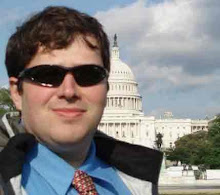(*- I'm more impressed with myself for remembering this from Psychology 101 class in Fall 2002 in Bailey Hall, than I am with psychologist for coming up with the effect. Of course, the reason I remember this class so vividly isn't for the class itself but rather the instructor, Dr. Jim Maas. I have never in my entire life attended a series of lectures by someone who thought so highly of himself and felt the need to share this opinion with his subjects on such a regular basis. The class was practically a shrine to his achievements, including the mandatory reading of his own book. My favorie Jim Maas story however has nothing to do with the class. My friend and former roommate Bhargav had sprained his ankle at one point, and needed a ride onto campus. So we piled into my saturn and stopped outside of his building. Mass pulls up behind us, and while we are helping the obviously injured and on crutches Bhargav out of the car Maas lays on the horn, flailing his arms about wildly. The kicker was that there was room for him to drive around us. The amazing thing is that as much as I envy Mass' academic success (I mean who wouldn't, he teaches the largest undergraduate lecture in the US, has multiple books read and is a successful researcher at an Ivy League school), I would never want to be like him in a million years.)

File drawer effect, gets its name from file drawer cabinets, where in years passed researchers would dutifully file interesting research papers on topics related to their research. Researchers would pick out papers that agree with their hypothesis, and ignore or file away deeply in their drawers papers that disagreed with their hypothesis. Thus, you create a large cache of supportive papers and ignore (the occasionally massive) the collection of papers that contradict your research.
This premise materializes itself with tales of the supernatural. You may walk up a flight of stairs in your home over 10,000 times in your life. In all likelihood nothing odd will happen 9,999 times. However if one time by chance, a ball suddenly bounces down the stairs in the middle of the night, and out observe it, you will remember that freak occurrence. In fact you will almost certainly not recall the other 9,999 times when nothing out of the ordinary occurred, but then point to that one time as proof that a ghost lives in your staircase and haunts you late at night.
Perhaps this explains why the more educated you are the more likely you are to believe in the supernatural.
The 2006 study of college students, done by Bryan Farha at Oklahoma City University and Gary Steward Jr. of the University of Central Oklahoma, reached a similar conclusion. Belief in the paranormal — from astrology to communicating with the dead — increases during college, rising from 23 percent among freshmen to 31 percent in seniors and 34 percent among graduate students.
I hypothesize that as you progress in education you are trained in the art of observation, and learn to draw hypothesis and inferences from these observation. In the case of extremely unlikely occurrences, rather than attribute things to chance (which trained scientists often never do), we attribute this to the supernatural.
Well my point to all of this is don’t believe what you remember when it comes to the environment. What you remember is likely to be biased to what you want to remember. When grandpa tells you he had to walk up hill in snow up to his knees to get to school he’s probably right, that did happen. However, it probably only happened once, and he has since selectively recalled this event, ignoring all the other days that he did not walk to school in snow up to his knees.




1 comment:
good conclusion!
Post a Comment